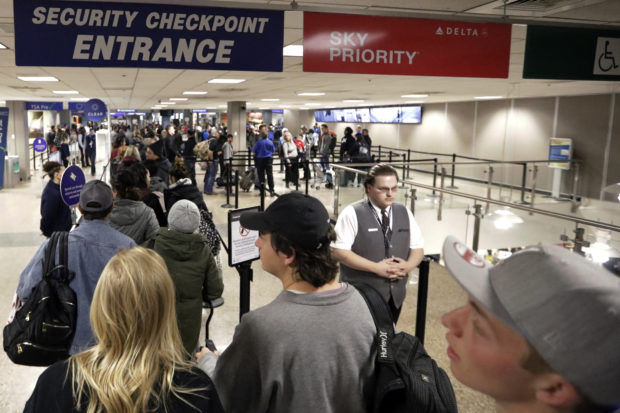DHS may require US citizens be photographed at airports
DALLAS – Federal officials are considering requiring that all travelers — including American citizens — be photographed as they enter or leave the country as part of an identification system using facial-recognition technology.

FILE – In this Wednesday, Nov. 27, 2019, file photo, travelers walk through a security checkpoint in Terminal 2 at Salt Lake City International Airport, in Salt Lake City. Federal officials are considering requiring that all travelers, including American citizens, be photographed as they enter or leave the country as part of an identification system using facial-recognition technology. (AP Photo/Rick Bowmer, File)
The Department of Homeland Security says it expects to publish a proposed rule next July. Officials did not respond to requests for more details.
Critics are already raising objections.
Sen. Edward Markey, D-Mass., said Tuesday he will introduce legislation to block the plan and prohibit U.S. citizens from being forced to provide facial-recognition information. He said a recent data breach at Customs and Border Protection shows that Homeland Security can’t be trusted with the information.
Facial recognition is being tested by several airlines at a number of U.S. airports. American citizens are allowed to opt out of being photographed, although a 2017 audit by a federal watchdog agency found that few U.S. travelers exercised that right — barely more than one per flight.
Federal law requires Homeland Security to put into place a system to use biometrics to confirm the identity of international travelers. Government officials have made no secret of their desire to expand the use of biometrics, which they say could identify potential terrorists and prevent fraudulent use of travel documents.
Article continues after this advertisementHomeland Security announced the possibility of expanding biometrics to U.S. citizens in a recent, brief filing. A spokesman for U.S. Customs and Border Protection, part of Homeland Security, said there would be a chance for the public to comment on any change in regulations.
Article continues after this advertisementIn a November 2018 report, Homeland Security said facial recognition is the best biometric approach at borders because it can be done quickly and “with a high degree of accuracy.” The agency said privacy risks “are mostly mitigated.” Photos used to match Americans to their identities are deleted within 12 hours, according to the report.
Jay Stanley, a policy analyst for the American Civil Liberties Union, said the government has told the public and Congress repeatedly that American citizens would be exempt from mandatory biometric screening.
“This new notice suggests that the government is reneging on what was already an insufficient promise,” Stanley said in a statement. “Travelers, including U.S. citizens, should not have to submit to invasive biometric scans simply as a condition of exercising their constitutional right to travel.”